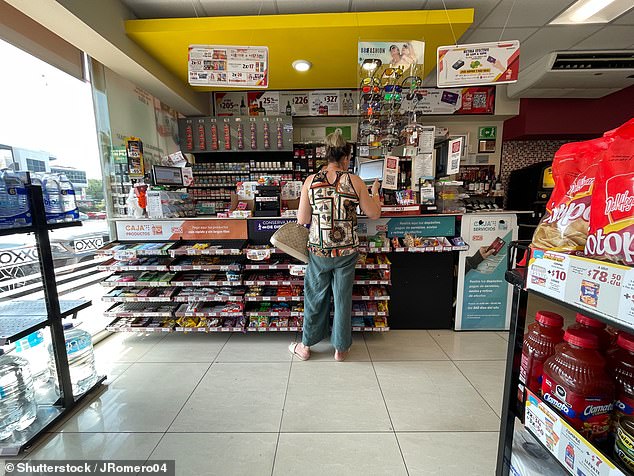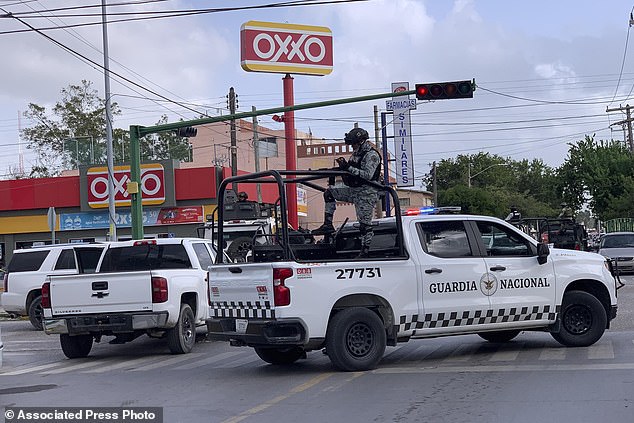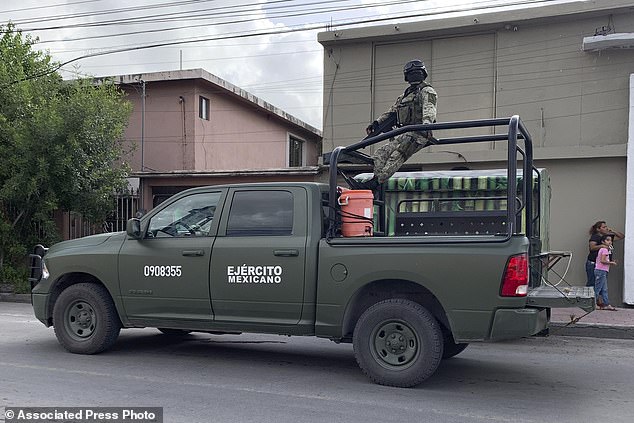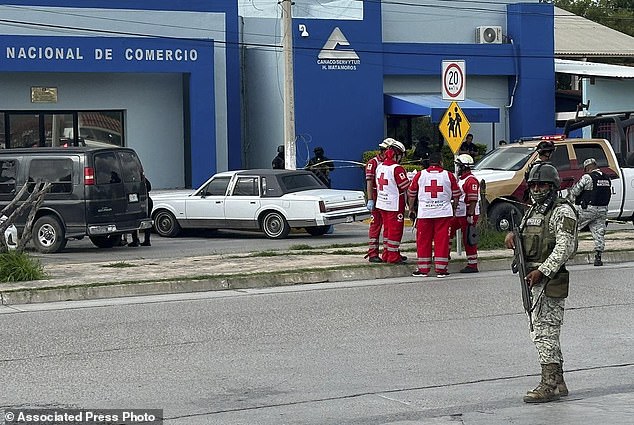A major Mexican supermarket chain has been forced to close all of its stores in a troubled region after a significant increase in incidents involving drug cartels and gangs.
Oxxo, Mexico’s largest supermarket chain, announced late last week that it would close its 191 stores and seven gas stations in Nuevo Laredo, Tamaulipas.
The problem came to a head when Femsa Corporation, the operator of the chain, alleged cartel claims regarding fuel distributors.
However, in recent weeks, gang members have kidnapped two store employees and demanded that they act as lookouts or provide information to the gangs.
Because most people in Mexico use convenience stores, they are seen by gangs as a good place to monitor the movements of police, soldiers and rivals.

Oxxo, Mexico’s largest supermarket chain, announced late last week that it would close its 191 stores and seven gas stations in Nuevo Laredo


Mexican soldiers stand guard outside an Oxxo supermarket near the Tamaulipas Chamber of Commerce, where president Julio Cesar Almanza was killed, in Matamoros, Mexico, Tuesday, July 30, 2024. (AP Photo/Veronica Cisneros)
Robert Campa, Femsa’s corporate affairs director, told local media: “We have had incidents in stores where gangs have demanded that we provide certain information. They have even kidnapped two colleagues to enforce this demand.”
Femsa said in a statement Monday that its stores in Nuevo Laredo will remain closed this week “due to violent acts that endanger the safety of our colleagues.”
Cartel violence in Mexico has long focused on smaller businesses, with owners kidnapped or targeted by gang members for extortion money.
However, Femsa is the largest soft drink bottler in Latin America, the largest Coca-Cola bottler by sales volume and is listed on the Mexican stock exchange.
New Laredo has long dominated by the Northeast Cartel – an offshoot of the old Zetas cartel – but the problem is also beginning to affect larger companies across the country.
Sectors ranging from agriculture, fishing and mining to consumer goods are plagued by cartels that are essentially trying to take over their industries.
Julio Almaza, head of the Federation of Business Chambers in Tamaulipas, gave interviews on Monday in which he complained about extortion by drug cartels in the state.
Hours later on Tuesday, Almaza was shot dead outside his office in the city of Matamoros, across from Brownsville, Texas.


Mexican soldiers stand guard outside the Tamaulipas Chamber of Commerce, where president Julio Cesar Almanza was killed, in Matamoros, Mexico, Tuesday, July 30, 2024. (AP Photo/Veronica Cisneros)
In one of his last interviews he said: ‘We are hostages of extortion demands, we are hostages of criminal gangs.
‘Soliciting extortion money has practically become a national sport in Tamaulipas.’
This week, the U.S. Chamber of Commerce, whose members tend to be larger Mexican, U.S. or multinational corporations, released a survey of its members. It found that 12 percent of respondents said that “organized crime has taken partial control over the sale, distribution and/or pricing of their goods.”
This means that drug cartels disrupt parts of the Mexican economy by determining who can sell a product and at what price.
In return, they apparently demand that sellers return a percentage of the sales proceeds to the cartel.
In the past, cartels have committed violent attacks, arson and even murder against people caught selling goods not “authorized” by them or purchased from distributors they controlled.


Almanza, seen here, was shot dead outside his office in the city of Matamoros, across from Brownsville, Texas


Investigators collect evidence at the scene where Almanza, president of the Tamaulipas Chamber of Commerce, was murdered in Matamoros
About half of the 218 companies that responded to the American Chamber survey said that trucks carrying their products had been attacked. Forty-five percent of the companies said they had received extortion demands in the form of protection payments.
Of those companies that indicated how much they had to spend on security measures, 58% said they spent between 2% and 10% of their total budget on security; 4% said they spent at least one-tenth of their total expenditure on security measures.
On Tuesday, Femsa said in a statement that progress is being made in talks with authorities to provide guarantees for the safety of workers and to authorize the chain to reopen its stores in Nuevo Laredo.
Mexico’s powerful drug cartels have expanded their sources of revenue by both extorting money from businesses and taking over legitimate businesses.
In 2014, authorities confirmed that the Knights Templar Cartel had effectively taken over iron ore exports from the western state of Michoacan, and that the ore trade with China may have become its largest source of revenue.
Cartels are also accused of controlling production and manipulating domestic prices for crops such as avocados and limes.
Late last year, authorities in Michoacan confirmed that a cartel had set up its own makeshift internet system and told locals they had to pay to use the Wi-Fi service or they would be killed.
The cartel’s system, dubbed “narco-antennas” by local media, consisted of internet antennas set up in various cities and built using stolen equipment.
The group charged about 5,000 people raised prices of between 400 and 500 pesos ($25 to $30) per month.
Femsa’s Oxxo supermarkets are targeted in part because they are so ubiquitous in Mexico: there are about 20,000 of them nationwide.
In 2022, gangs set fire to about two dozen stores in the central state of Guanajuato in protest against attempts to arrest a cartel leader.
On Wednesday, President Andrés Manuel López Obrador – whose policy is aimed at avoiding confrontations with the cartels – presented the recommendations made by the authorities to Femsa during a meeting on Monday.
The recommendations placed much of the responsibility on the company, requiring it to hire security guards, install panic buttons and place cameras outside stores.
In 2009, police in the western state of Jalisco found at least four severed heads in Styrofoam coolers with the store’s logo on them. Such coolers were sold to store cold drinks, but it became a trend among gangs to use them to store severed heads.



